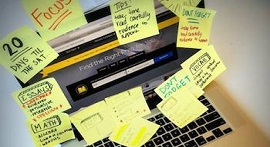Academics
The Massachusetts Institute of Technology is renowned for its engineering, science, and Mathematics departments. Academic programs at MIT feature 65 unique research centers, and faculty and students currently collaborate with around 700 companies on projects ranging from computational science to gender studies. "The administration's attitude toward students is one of respect. As soon as you come on campus, you are bombarded with choices," including "research opportunities for undergrads with some of the nation's leading professors." MIT's "amazing collection of creative minds" encourages students to problem-solve and think critically. A chemical engineering major elaborates: "MIT is different from many schools in that its goal is not to teach you specific facts in each subject. MIT teaches you how to think, not about opinions but about problem-solving. Facts and memorization are useless unless you know how to approach a tough problem." As expected, MIT has "excellent teachers who make lectures fun and exciting." One student says that professors "make a serious effort to make the material they teach interesting by throwing in jokes and cool demonstrations." While the academic challenges students face "definitely push [you] beyond your comfort level," students laud MIT as "the ultimate place for information overload, endless possibilities, and expanding your horizons."
Student Body
"Contrary to MIT's stereotype, most MIT students are not geeks who study all the time and have no social skills," explains one student. "The majority of the students here are actually quite 'normal.'" Many fellow students agree: Most students do have some form of 'nerdiness'" (like telling nerdy jokes, being an avid fan of Star Wars, etc.), but the "stereotypical student [who] looks techy...only represents about 25 percent of the school." Others concur, saying that there actually isn't one typical student at MIT." As one student elaborates, MIT has all types: "multiple-sport standouts, political activists, fraternity and sorority members, hippies, clean-cut business types, LARPers, hackers, musicians, and artisans." Adding that not everyone relates to everyone else, but most people get along, and it's almost a guarantee that you'll fit in somewhere." As one undergrad sums up, "The one thing students all have in common is that they are insanely smart and love to learn. Pretty much anyone can find the perfect group of friends to hang out with at MIT."
Campus Life
It may seem...like there's no life outside problem sets and studying for exams, but in reality, MIT students have "access to an amazing number of resources, both academic and recreational." Students also report that "there's always time for extracurricular activities or just relaxing. And students occasionally find time to "pull a hack," or an elaborate practical joke-presumably to counteract academic stress. One such hack featured "the life-size Wright brothers' plane that appeared on top of the Great Dome for the one-hundredth anniversary of flight." Undergrads say that "MIT has great parties-a lot of Wellesley, Harvard, and BU students come to them" but also that "there are tons of things to do other than party" here. That includes "enjoying the largest collection of science fiction novels in the United States at the MIT Science Fiction Library" as well as "movies, shopping, museums, and plays....[and] great restaurants only [blocks] away from campus, too." On campus and off, the MIT experience builds a strong sense of unity. Ask any "MIT alumni where they went to college, most will immediately stick out their hand and show you their 'brass rat' (the MIT ring)."




